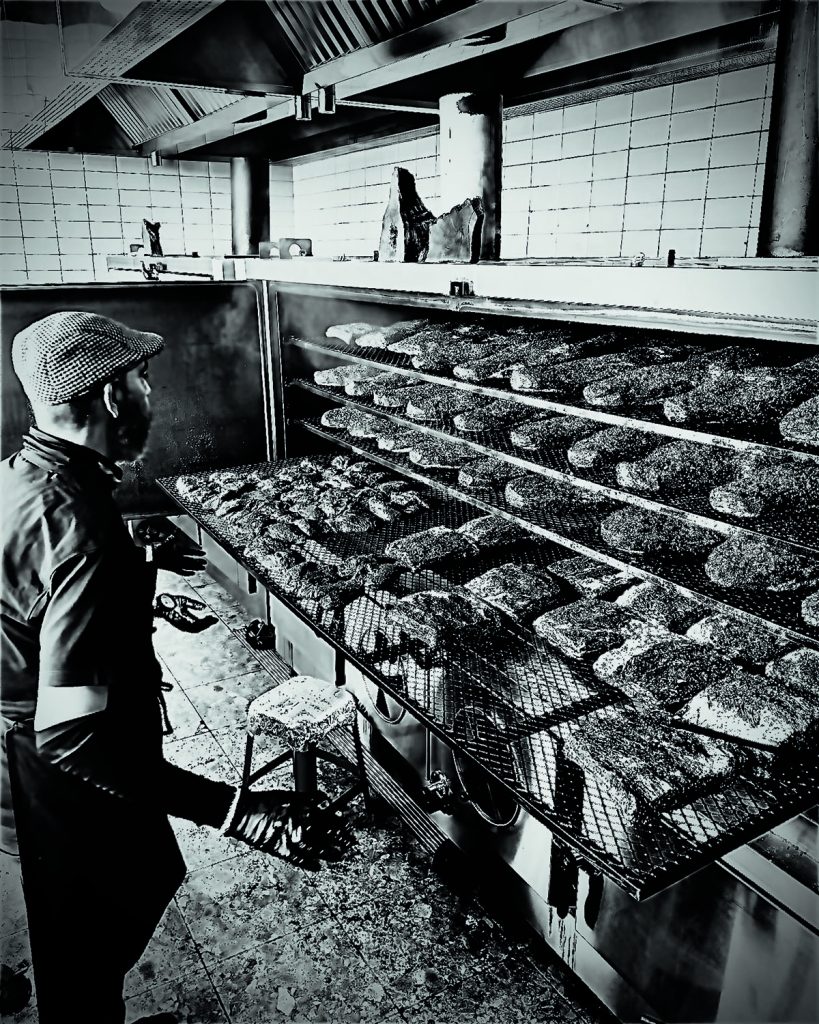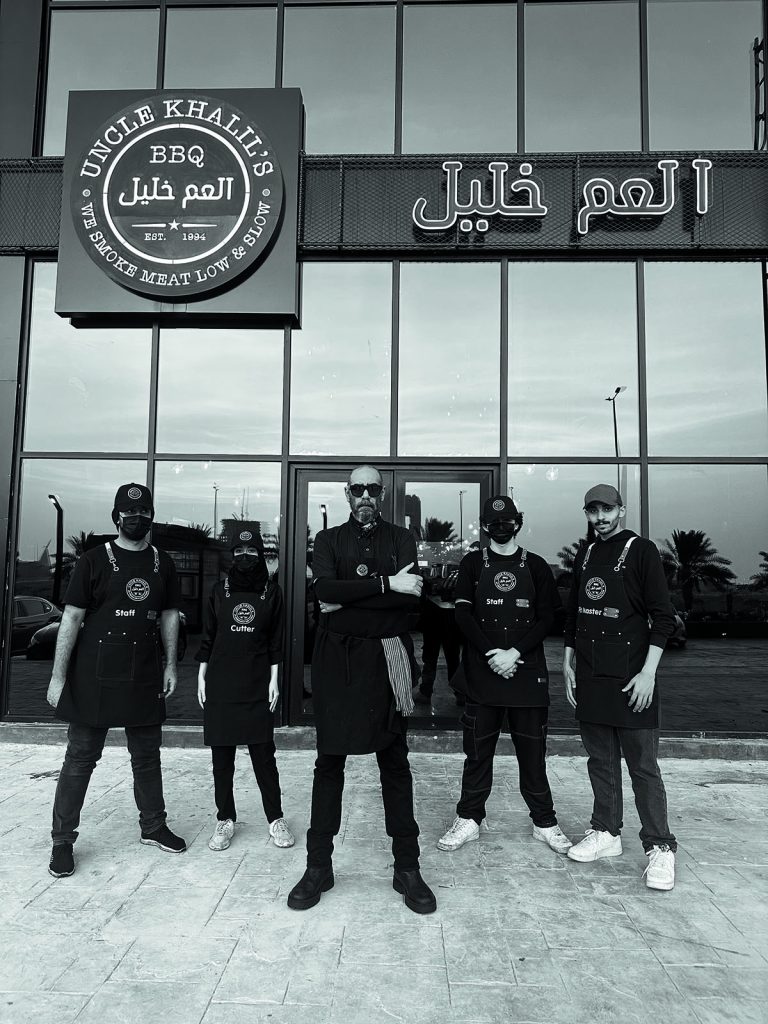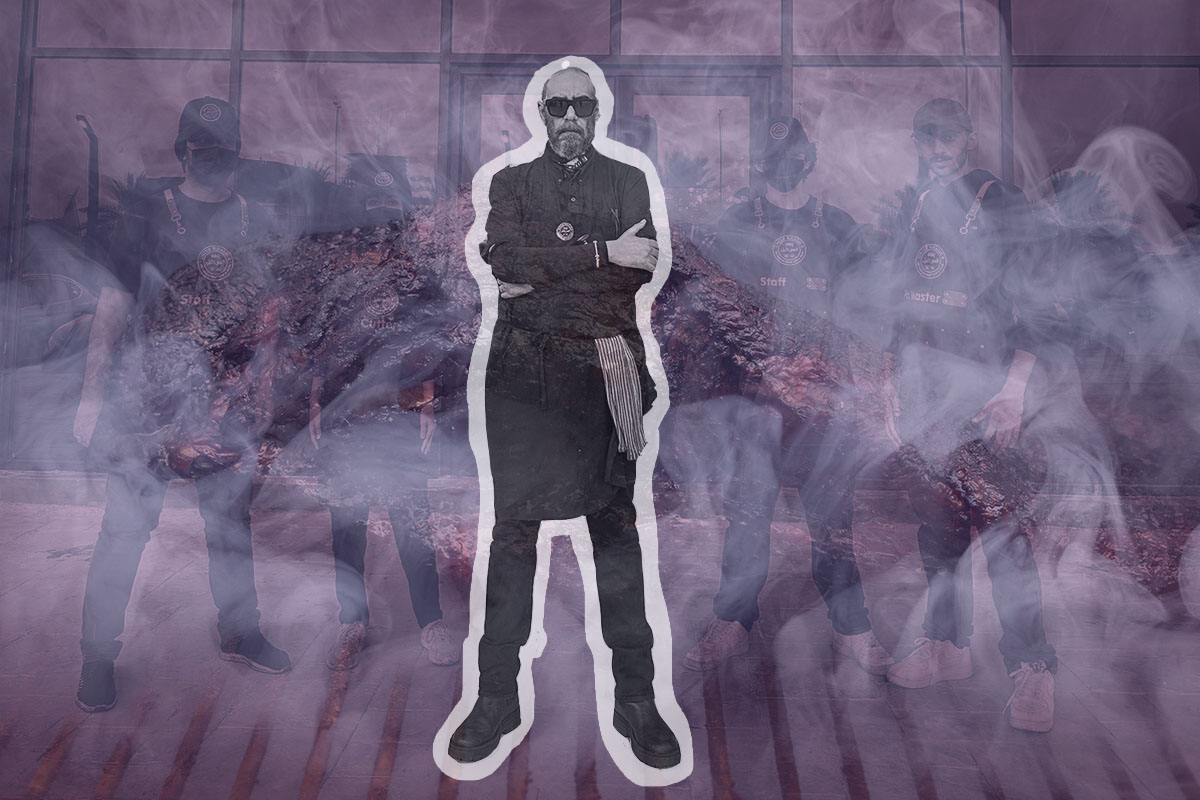Khalil Khazander has scars all over his hands and arms. He doesn’t hide them, in fact he views them with a sense of pride. The scars are burn marks, from years of working with fire—literally. “We like to say that if you are a good pitmaster, then the metal likes to ‘kiss your hands’ out of appreciation,” he says. Khalil Khazander is known exactly as that, a good pitmaster. A great pitmaster, in fact. In Saudi, such is his growing reputation, he is affectionately known as Uncle Khalil, “the Godfather of Smoked Meat”.
Humans have been using fire for cooking since ancient times, but in the past two centuries, new techniques emerged that removed the meat from the direct flame, instead cooking it slowly over a low heat for extended periods of time. “Barbecue and smoking meat are not two separate things, they are both in the same family of cooking meat— but smoking meat is more of an art form. It is the highest level of cooking meat,” says Khazander.
At first it seems strange to be thinking of cooking meat as an ‘art’ but when you consider it more deeply, it is indeed that. The meat is cooked slowly and on a low heat for many, many hours. The longer the cook, the more careful a pitmaster’s consideration goes into the impact that key elements will have on the flavour. What type of wood is used to fuel the fire? How does it affect the temperature? How it affects the flavour of the meat over time. The business of smoking meat, and smoked meat restaurants is a booming one in Saudi, and with a continuously growing ‘eating out’ culture, where the Kingdom’s own ‘Uncle Khalil’ is luring people in with its incredible brisket.

A Saudi national, Khalil Khazander was born in the United States—California, to be precise. He’s a t-shirt and flip-flops kind of guy, at his happiest when he is relaxed and in nature. He wasn’t born into a barbecue family, but developed his passion for smoked meat and barbecue nearly 30 years ago, when he visited ‘Louis Mueller’—an historic restaurant in Texas. At first Khazander was not impressed with the look of the food. The pieces of meat were black and resembled burnt coal. However, after eating it and learning more about the simple spices used to season the meat, he was immediately hooked. It was the moment that he was “bitten by the barbecue bug”, and things have never been the same since. Today, he owns a chain of restaurants called ‘Uncle Khalil’s’ that offer the finest smoked meat in the Kingdom.
It’s important to state that when it comes to barbecue, Uncle Khalil does things very much in a Texas-style. This it’s an important distinction. In the US, how you make your barbecue, and how you smoke your meat is akin to your culture, your history and your personality. There is a big difference from how meat is cooked and prepared in Louisiana, than how it is in Texas.

Smoking meat Texas-style means that the meat is cooked only using salt and pepper. There is no rub, there is no barbican, there is no flavoured onion powder, there is no brown sugar—the flavour comes from the careful combination of meat (seasoned with salt and pepper), the type of wood used, and the amount of heat and time the meat is exposed to it.
The history of smoked meat is a matter of debate. Some believe that it originated with the Spanish explorers who arrived in the Americas, while others believe that it was developed by the Native Americans. The first documented evidence of smoked meat in the United States dates back to the 18th century, when German butchers began smoking meat to preserve it.
In the early days of Khazander’s journey with ‘Uncle Khalil’, he simply wanted to share his love of smoked meat with his friends and family. Eventually as things began to become more popular, he started selling smoked meat from his home once a week, and his business quickly grew, despite many challenges along the way—including the long cooking time; the lack of skilled labour; and the need to balance the artistic and commercial aspects of his business. “I am not a businessman. I am an artist who is passionate about smoked meat. My goal is to share my love of this art with the world,” he tells Esquire Saudi. In 2015, he opened his first restaurant in Jeddah, and he has since expanded to Riyadh.
According to Khazander, the secret to his success is his passion for the art, and his ability to transmit that passion to others. “Smoking meat is like a work of art that is fueled by passion and appreciation,” he says. “It requires attention to detail, such as the intensity of the fire, the shape, and the texture. It is an art in every sense of the word. When cooking smoked meat, all of your senses must be alert to achieve the best result.”

Cooking around fire not only is a way to enhance flavour and make certain food more edible, but it is also a fundamental building block for how society is created—how communities come together around food and fire. It is something that Khalil Khazander is very aware of.
Uncle Khalil is committed to preserving the traditional methods of smoked meat while also incorporating local flavours and ingredients. He is currently experimenting with smoking camel meat, which he believes has the potential to become the next ambassador for smoked meat from Saudi Arabia. He says, “I am still in the early stages of experimentation, but the results are promising. Camel meat has a unique flavour that I believe will appeal to a global audience.”
A true pioneer in the world of smoked meat, Uncle Khalil has brought this delicious and unique cuisine to Saudi Arabia, and he is now working to share it with the world. His passion and dedication to his craft are an inspiration to us all—working with his own two hands, scars and all.
